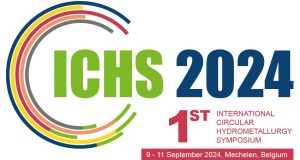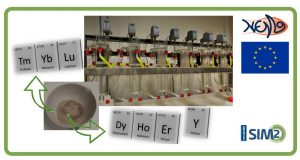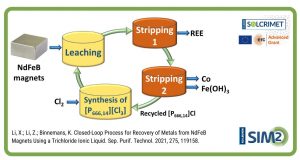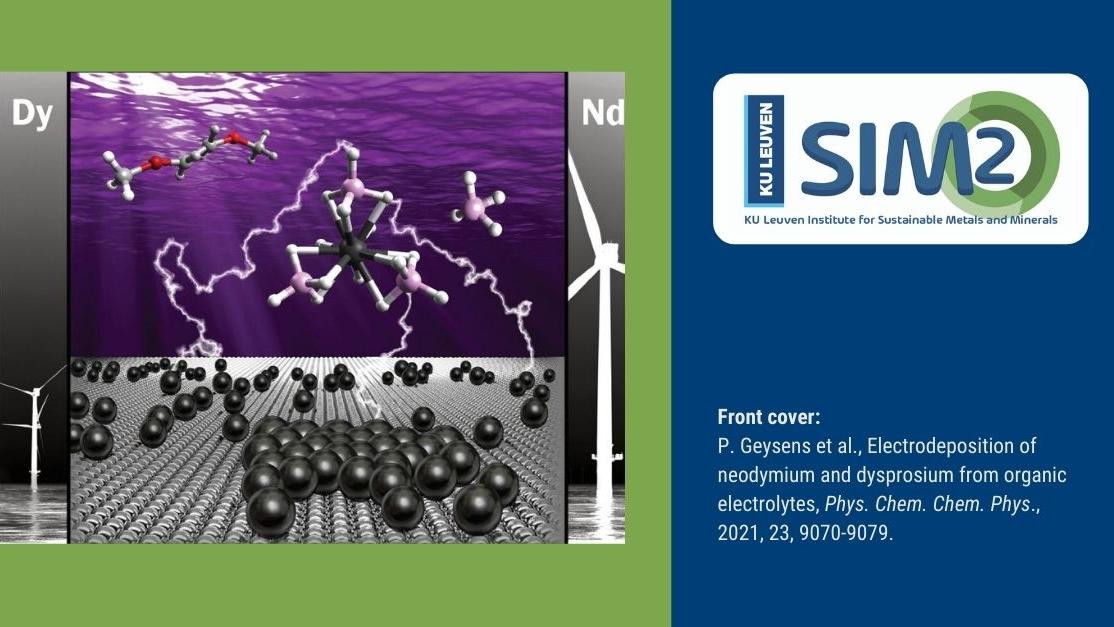Isadora Reis Rodrigues is a PhD student at the Department of Materials Engineering (MTM) at KU Leuven. She is working on the development of a physical separation method for rare-earth ions using strong magnetic fields. The work is performed under the supervision of Prof. Jan Fransaer (MTM) and Prof. Koen Binnemans (Dept. of Chemistry). (Leuven, 7-5-218)
Why did you choose to work in Belgium?
I have always been a traveler: before Belgium I lived in Canada, South Asia, and North Africa. When I moved to Europe, I spent some time moving between places. I was first in Antwerp (Belgium), then in Thun (Switzerland), and finally in Lille (France). Among these 3 European countries, Belgium was by far the country where I felt the most at home. This is definitely the first reason why I looked to come back here when I decided to do my PhD. I may add the very fortunate feeling of having Brussels so close, it is not only the capital of Europe, but also this colourful melting pot of so many cultures, which I like a lot.
What are you working on?
I am working in a project where we use strong magnetic fields to develop a physical separation method for rare-earth (RE) ions. Many elements from the RE group are considered critical because of their role in the production of permanent magnets, the use in green technologies and in many daily life devices. More sustainable routes for the production and recycling of these metals are crucial. In this sense, the big picture of the project I work on is to develop a cleaner alternative for the chemical separation methods which are traditionally available. The idea of a magnetic separation method is particularly interesting for RE ions, as across the RE group the magnetic properties vary significantly (i.e. Y3+ is diamagnetic, Nd3+ is paramagnetic and Dy3+ is strongly paramagnetic). The use of magnetic fields to manipulate macroscale particles is a well-known method applied to the separation of magnetic materials. However, the effect of magnetic fields on small molecules and ions, is rather controversial, which is at the same time challenging and exciting.
What attracts you in the research project you are working on?
First of all, I like to think my work can have an impact towards cleaner industrial processes. The environmental aspect is since long time a crucial engagement for me. Secondly, the fact that together with few other research groups around the world, we are still looking for very fundamental answers. Trying to solve this “magnetic” scientific puzzle is quite interesting: how the magnetic force acts in a solution of ions, the impact of the experimental conditions, etc. Each small step is constantly teaching me something new. Finally, most of my work has been based on a technique called Mach-Zehnder interferometry: it is very visual, we can actually see the mobility of the ions during the magnetisation experiments. This brings a very interactive-colourful perspective to my work. Ah! and please, let me not forget about one very important part, the colleagues with whom I share the daily lab life, they make all the difference.
What helps you to overcome the difficulties of life?
One of the things that helps me a lot, is to simply work. I figured out that active mind and body are very useful tools to build on and to sustain the inner strength to face life issues. Other thing that I cherish a lot is to have few small rituals to bring a type of meaningfulness to the everyday life, this is also one of my good anchors.
When are you the happiest?
When I am drinking chimarrão (typical tea from south Brazil) in my mom’s sunny garden and my two nieces are around. Also, I feel very happy when I have the chance to teach yoga or when I am in my kitchen cooking something vegan for friends.
Bio Isadora Reis Rodrigues
 Isadora Reis Rodrigues was born in Cruz Alta, Brazil, 1982. In 2004 she obtained a Bachelor Degree in Industrial Chemistry at the Universidade Federal de Santa Maria. She moved to Canada in 2007 to conduct her Masters Studies at the Université de Montréal, where she worked in the field of lithium-ion batteries. Her growing interest in sustainable technologies in general, and rechargeable batteries in particular, brought her to work for IREQ (Canda) and FPTI (Brazil), both research institutes active in the energy sector and engaged with e-mobility. Currently, she is in her third year of her PhD studies at the Department of Materials Engineering at KU Leuven, working on the magnetic separation of rare-earth ions, under the supervision of Prof. Jan Fransaer (Dept. of Materials Engineering) and Prof. Koen Binnemans (Dept. of Chemistry).
Isadora Reis Rodrigues was born in Cruz Alta, Brazil, 1982. In 2004 she obtained a Bachelor Degree in Industrial Chemistry at the Universidade Federal de Santa Maria. She moved to Canada in 2007 to conduct her Masters Studies at the Université de Montréal, where she worked in the field of lithium-ion batteries. Her growing interest in sustainable technologies in general, and rechargeable batteries in particular, brought her to work for IREQ (Canda) and FPTI (Brazil), both research institutes active in the energy sector and engaged with e-mobility. Currently, she is in her third year of her PhD studies at the Department of Materials Engineering at KU Leuven, working on the magnetic separation of rare-earth ions, under the supervision of Prof. Jan Fransaer (Dept. of Materials Engineering) and Prof. Koen Binnemans (Dept. of Chemistry).

 European Training Network for the Design and Recycling of Rare-Earth Permanent Magnet Motors and Generators in Hybrid and Full Electric Vehicles (DEMETER)
European Training Network for the Design and Recycling of Rare-Earth Permanent Magnet Motors and Generators in Hybrid and Full Electric Vehicles (DEMETER)



